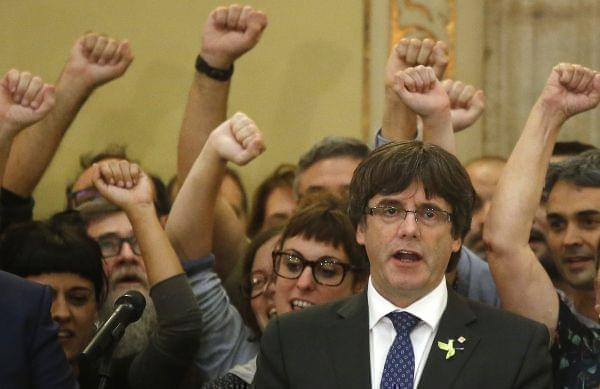Catalonia Declares Independence; Spain Approves Central Takeover Of Region

Catalan President Carles Puigdemont sings the Catalan anthem inside the parliament after a vote on independence in Barcelona, Spain, on Friday. Catalonia's regional parliament has passed a motion saying they are establishing an independent Catalan Republic. Manu Fernandez/AP Photo
Lawmakers in Catalonia have declared independence from Spain, in a historic vote that prompted protests and celebration
The government in Madrid, vowing to halt any would-be secession, has authorized the Spanish prime minister to take over direct rule of the previously semi-autonomous region.
The vote in Catalonia's Parliament comes nearly a month after the region held a referendum on independence, over Spain's vehement objections. The regional president then declared his support for separation from Spain, but also called for talks with Madrid, in an ambiguous speech.
Spain's central government, promising to crack down harshly if the declaration was real, told the region's leaders to make up their mind: Yes, or no? Independence, or not?
Now it's final: Independence, Catalonia said.
Secessionists have a slight majority in the parliament, but the vote on Thursday was 70 in favor of independence, 10 against and 2 blank ballots, the Associated Press reports — because most of the pro-unity opposition left the vote in protest before the ballots were cast.
One member of the opposition protested the declaration of independence, saying it would leave pro-union Catalans "orphaned without a government." Pro-independence Catalans, meanwhile, celebrated outside the parliament building.
Thousands of people had gathered to watch the vote, waving flags and chanting "freedom" as regional lawmakers debated. After the vote, there was cheering and dancing, the AP writes.
Spain says it will not tolerate any claim of independence.
Earlier on Thursday, Spain's Prime Minister Mariano Rajoy had asked the country's Senate for the power to impose direct rule over secessionist Catalonia, saying he would use it first to depose the region's president.
The Senate approved that request just minutes after Catalonia's vote was final, Reuters reports.
Rajoy delivered an impassioned speech to loud applause in the chamber, insisting that Catalonia's declaration of independence is "a clear violation of the laws, of democracy, of the rights of all, and that has consequences."
The Spanish premier said he would immediately dismiss Catalan President Carles Puigdemont if the Senate approved invoking Article 155 of Spain's Constitution, allowing it to abrogate Catalonia's autonomy.
His Cabinet is now expected to convene to plan the initial steps of taking power in Catalonia, which could also include direct supervision of Catalan police forces, Reuters writes.
On Thursday, Puigdemont said no to a regional election that might have helped to calm tensions with Madrid.
As we have written previously: "Catalonia, which includes the city of Barcelona and is one of Spain's wealthiest and most culturally distinct regions, voted overwhelmingly on Oct. 1 to secede from Spain. Puigdemont then declared independence but suspended it in nearly the same breath while calling for talks with Madrid. Catalan lawmakers also passed articles of secession."
And NPR's Chris Benderev writes: "The referendum went 90 percent in favor of independence, but with only about half of registered voters turning out. Massive street protests in favor of unity came a week after the vote."
Spanish courts had already ruled the election illegal, and Spain's police countered pro-independence forces, in some cases violently, in an effort to stop the vote. ... More than one deadline for the clarification came and went with Puigdemont instead choosing an ambivalent stance: He proclaimed he now possessed a "mandate" to secede but was immediately pausing independence efforts to allow for talks."

